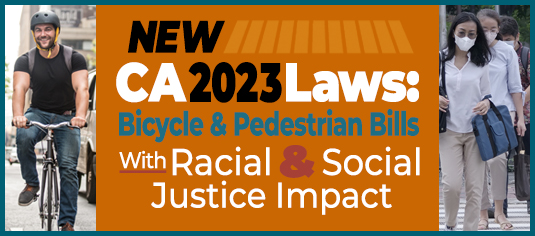New CA 2023 Laws: Bicycle & Pedestrian Bills With Racial & Social Justice Impact
Most people would not find the subject of new traffic laws something to “write home about,” or in modern-day terms, repost on social media. However, this year, two new California laws might just break that mold: Governor Gavin Newsom signed two pieces of legislation into effect which not only create bicyclists’ rights and legalize jaywalking, but were also designed to address current racial and social justice issues.
Effective January 1, 2023, the two newly-enacted laws you need to be aware of that directly affect drivers, bicyclists, and pedestrians on California’s roadways and bikeways, include:
AB 2147 “The Freedom to Walk Act” legalizes jaywalking in California, provided a reasonably careful person would not see an immediate danger of collision.
AB 1909 “The OmniBike Bill” creates four new rights for bicyclists. Most notably, the law requires drivers to change lanes when passing a bicyclist, safety permitting.
If you have been involved in an accident, whether a car, bicycle, pedestrian, or any other accident, the experienced personal injury lawyers at Carpenter & Zuckerman are ready to help. Contact CZ Law today to speak with a specialist about your case! Read on to learn key information you need to know about the new California traffic laws, and how they could impact your safety as a motorist, bicyclist, or pedestrian.
Jaywalking Legal in CA, Unless Immediate Danger of Collision
Introduced by Assemblymember Phil Ting (D-San Francisco), and signed into law by Governor Gavin Newsom, AB 2147, known as The Freedom to Walk Act took effect on January 1, 2023, and rendered jaywalking an offense only when a “reasonably careful person would recognize an immediate danger of a collision.”
Assembymember Ting was motivated to improve pedestrian safety and to promote fairness in the application of pedestrian laws. Commenting on the bill, he said, “It should not be a criminal offense to safely cross the street. When expensive tickets and unnecessary confrontations with police impact only certain communities, it’s time to reconsider how we use our law enforcement resources and whether our jaywalking laws really do protect pedestrians.”
Under previous California law, jaywalking was illegal. Prior to 2018, pedestrians could be cited for crossing the street at a traffic light once the countdown meter was flashing. With the enactment of the Freedom to Walk Act, jaywalking is now legal in California, and officers are only able to issue citations if pedestrians cross the street when it is clearly unsafe to do so.
The “Freedom to Walk Act” & Its Impact on Racism, Social Justice
Historically, the ban on jaywalking has been unevenly enforced, with BIPOC (black, indigenous, and people of color), as well as low-income individuals more often being issued citations. In addition to jaywalking laws being arbitrarily applied to BIPOC and low-income individuals, those in favor of decriminalizing jaywalking point out that lower-income areas often do not have the same infrastructure as affluent areas, including fewer designated crosswalks and pedestrian crossing buttons, leading to more citations in under-resourced communities.
Jaywalking Laws Disproportionately Impact People of Color
Several high-profile incidents listed on Assemblymember Ting’s website document the unfair application of jaywalking laws on people of color. These include:
Kurt Reinhold was killed by Orange County Sherrifs’ deputies in San Clemente in September 2020, after he was falsely accused of jaywalking.
Chinedu Okobi was killed by San Mateo County Sherrifs’ deputies during an attempted arrest for jaywalking in 2018.
Nandi Cain was beaten & seriously injured by Sacramento police when he was stopped for jaywalking in 2017.
Commenting on the impact of the new bill, Zal Shroff, Senior Staff Attorney at the Lawyers’ Committee for Civil Rights of the San Francisco Bay Area said, “For too long, our jaywalking laws were used as a pretext to stop and harass people, especially low-income people and people of color. The reforms enacted in AB 2147 will put an end to that and, in doing so, make all of California safer for pedestrians.”
Important Safety Tips to Prevent Pedestrian Accidents
While the legalization of jaywalking is reasonable in certain circumstances, National Highway Traffic Safety Administration (NHTSA) statistics show that pedestrians violating traffic laws are responsible for a significant number of accident cases in the United States. In fact, NHTSA data indicate that 19.1% of pedestrian fatalities in 2019 were caused by improper crossings of roadways or intersections. Also according to NHTSA data, California had the highest number of pedestrian fatalities than any other state in 2020.
Given the fact that pedestrian accidents do occur as a result of improper street crossings, there will undoubtedly be additional accidents related to the legalization of jaywalking in California. Keep the following safety measures in mind whenever you are crossing the street, and especially if you decide to cross outside of a designated crosswalk:
Obey traffic laws and posted signage whether you are a pedestrian or a motorist.
Use designated crosswalks whenever possible; the law has changed, but drivers are still accustomed to looking for pedestrians at crosswalks.
Make eye contact with motorists prior to crossing in front of their vehicle, even when you have the right of way.
Use sidewalks whenever possible; otherwise, walk facing traffic.
Stay alert and aware of your surroundings; avoid the use of handheld electronics, headphones, and other distractions near busy intersections and roadways.
Avoid alcohol and drug use; alcohol is consistently a factor in almost half of all traffic-related fatal pedestrian accidents.
Enhance your visibility at night by wearing bright or reflective clothing and using a flashlight.
New “OmniBike Bill” Adds to Bicyclists’ Rights in CA
Bicycle safety is a major issue across the United States. In collisions involving bicyclists and automobiles, bicyclists face a much higher risk of sustaining severe injuries than motorists traveling in enclosed vehicles. According to National Safety Council statistics, 806 out of 1,260 bicyclist deaths in 2020 were due to motor-vehicle traffic collisions.
In California, Assemblymember Laura Friedman authored AB 1909, known as the OmniBike Bill to address bicycle safety in the state. Signed by Governor Gavin Newsom, the newly-enacted bill makes several important changes to the California Vehicle Code, aimed at protecting cyclists on California roadways, reducing harassment of people on bikes, and increasing e-bike access to bikeways in the state.
4 Significant Provisions of “The OmniBike Bill”
- Requires drivers to change lanes to pass bicyclists, whenever possible - An older bill required drivers to pass bicyclists while leaving a three-foot margin; however, this was difficult to measure and enforce. AB 1909 requires drivers to move to another lane, when passing a bicyclist, whenever possible.
- Allows bicyclists to cross through intersections at pedestrian walk signals - This provision of the OmniBike Bill will go into effect on January 1, 2024 and will allow bicyclists to cross streets during the pedestrian walk signal, rather than being limited to crossing during a green traffic light.
- Gives Class 3 e-bikers access to all bikeways - Where e-bikes were previously banned on many bike trails, the new bill gives e-bikes access to most bikeways. However, it preserves the right of authorities to ban e-bikes on equestrian, hiking, and recreational trails.
- Removes requirement for bicycle registration & licensing - The OmniBike bill removes bicycle registration and licensing requirements throughout California. Although frequently unknown and unenforced, some say these requirements were used to harass youth and BIPOC.
The OmniBike Bill’s Impact on Racial & Social Justice
CalBike, a California bicycle advocacy group, is a major supporter of both the Freedom to Walk Act and OmniBike Bill. According to their website, CalBike’s stated mission includes their commitment to mobility justice, and involves “working to undo the structural racism and inequity built into California’s transportation infrastructure and policymaking.” CalBike notes that some jurisdictions in California selectively enforced bicycle licensing laws as a way of harassing youths and BIPOC. The OmniBike Bill’s provision to remove bicycle licensing requirements in California removes this particular mechanism for the unfair treatment of BIPOC.
Steps to Take After a Bicycle Accident
While the OmniBike Bill is aimed at improving bicycle safety and accessibility throughout California, bicycle accidents are an unfortunate reality that will continue as long as bicycles and automobiles share the roadway. In the event you are involved in a bicycle accident, follow these steps below to ensure you are protected and prepared if you decide to file a claim for damages:
- Call 911 if anyone if anyone is injured in the accident
- Remain with your bicycle or vehicle until emergency help arrives
- Request a police report for documentation purposes, even if no one appears injured
- Photograph injuries & property damage, as long as it is safe to do so
- Photograph conditions at the scene, such as road hazards and weather conditions
- Photograph important documents, including insurance cards and drivers licenses
- Do not admit fault for the accident, and provide only necessary information
- Get medically evaluated as soon as possible, and ask for a record of your visit
- Contact an experienced bicycle accident lawyer promptly after the accident
CZ: Firmly On Top of New CA Laws & Ready to Fight For You
The U.S. legal system was designed to evolve. As a personal injury law firm, Carpenter & Zuckerman stays abreast of all new legislation with the potential to impact our clients. Against the backdrop of an ever-evolving legal landscape, one thing that will never change is CZ Law’s commitment to protect our clients. We remain fiercely dedicated to ensuring our clients receive justice, including the compensation they deserve.
CZ Law is dedicated to being a voice for the voiceless and fighting on behalf of injured individuals against wealthy and powerful corporations. We are fiercely committed to delivering justice to injury victims and believe in the equitable treatment of all people. To date, we’ve recovered more than $2 billion in verdicts and settlements for our clients. With offices in Beverly Hills, Los Angeles, Garden Grove, San Diego, and Bakersfield, as well as Seattle, Washington, we are equipped and ready to fight for you.
If you’ve been involved in a car, bicycle, pedestrian accident, or any other accident, contact CZ Law today! We’re firmly on top of the new 2023 California traffic laws and ready to fight for the compensation you deserve. Call CZ Law today at (888) 484-2033, or fill out our form for a FREE consultation


